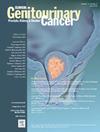Erdafitinib versus Chemotherapy in Fibroblast Growth Factor Receptor-Altered Advanced or Metastatic Urothelial Cancer After Progression on Anti-programmed Death-(Ligand) 1 Therapy: An Exploratory Analysis of the Asian Subpopulation in the THOR Phase 3 Study
IF 2.7
3区 医学
Q3 ONCOLOGY
引用次数: 0
Abstract
Introduction
The randomized phase 3 THOR study showed significantly longer survival with erdafitinib (pan-fibroblast growth factor receptor [FGFR] inhibitor) over chemotherapy in adults with FGFR-altered locally advanced or metastatic urothelial cancer (la/mUC) who had progressed during or after anti-programmed death-(ligand) 1 (anti-PD-[L]1) therapy (Cohort 1). This exploratory post-hoc analysis was conducted to evaluate the efficacy and safety of erdafitinib in the Asian subpopulation within THOR Cohort 1.
Patients and methods
Eligible patients were randomized in a 1:1 ratio to receive erdafitinib (8 mg once daily with pharmacodynamically guided up-titration to 9 mg) or chemotherapy (vinflunine or docetaxel once every 3 weeks). The primary endpoint was overall survival (OS).
Results
Seventy-six patients were included in the Asian subpopulation: 37 were randomized to erdafitinib and 39 to docetaxel. The median follow-up for survival was 15.7 months. The median OS was longer with erdafitinib than chemotherapy (23.3 months vs.11.3 months; hazard ratio [HR], 0.47; 95% confidence interval [CI], 0.23–0.96). One patient (2.7%) in the erdafitinib arm and 5 patients (15.2%) in the chemotherapy arm had grade 3 or 4 treatment-related serious adverse events (SAEs). One patient (2.7%) in the erdafitinib arm and 4 patients (12.1%) in the chemotherapy arm discontinued treatment due to treatment-related AEs.
Conclusions
Erdafitinib showed improved survival compared with chemotherapy, with no new safety concerns in the Asian subpopulation. These findings were consistent with those for the overall study population in THOR Cohort 1 who received prior anti-PD-(L)1 therapy.
在抗程序性死亡(配体)1治疗进展后,厄达非替尼与化疗对抗成纤维细胞生长因子受体改变的晚期或转移性尿路上皮癌:THOR 3期研究中亚洲亚群的探索性分析
3期随机THOR研究显示,在抗程序性死亡-(配体)1(抗pd -[L]1)治疗期间或之后,FGFR改变的局部晚期或转移性尿路上皮癌(la/mUC)成人患者中,使用erdafitinib(泛成纤维细胞生长因子受体[FGFR]抑制剂)比化疗的生存率显著延长。本探索性事后分析旨在评估erdafitinib在THOR队列1中亚洲亚群中的有效性和安全性。患者和方法:符合条件的患者以1:1的比例随机接受厄达非替尼(8mg,每日一次,药效学指导下滴定至9mg)或化疗(v氟宁或多西他赛,每3周一次)。主要终点是总生存期(OS)。结果:76名患者被纳入亚洲亚群:37名随机分配到厄达非替尼组,39名随机分配到多西他赛组。中位生存随访时间为15.7个月。厄达非替尼组的中位生存期比化疗组长(23.3个月比11.3个月;风险比[HR], 0.47;95%可信区间[CI], 0.23-0.96)。厄达非替尼组1例(2.7%)患者和化疗组5例(15.2%)患者出现3级或4级治疗相关严重不良事件(SAEs)。厄达非替尼组1例(2.7%)患者和化疗组4例(12.1%)患者因治疗相关不良事件而停止治疗。结论:与化疗相比,埃尔达非替尼的生存率有所提高,在亚洲亚群中没有新的安全性问题。这些发现与THOR队列1中接受过抗pd -(L)1治疗的总体研究人群一致。
本文章由计算机程序翻译,如有差异,请以英文原文为准。
求助全文
约1分钟内获得全文
求助全文
来源期刊

Clinical genitourinary cancer
医学-泌尿学与肾脏学
CiteScore
5.20
自引率
6.20%
发文量
201
审稿时长
54 days
期刊介绍:
Clinical Genitourinary Cancer is a peer-reviewed journal that publishes original articles describing various aspects of clinical and translational research in genitourinary cancers. Clinical Genitourinary Cancer is devoted to articles on detection, diagnosis, prevention, and treatment of genitourinary cancers. The main emphasis is on recent scientific developments in all areas related to genitourinary malignancies. Specific areas of interest include clinical research and mechanistic approaches; drug sensitivity and resistance; gene and antisense therapy; pathology, markers, and prognostic indicators; chemoprevention strategies; multimodality therapy; and integration of various approaches.
 求助内容:
求助内容: 应助结果提醒方式:
应助结果提醒方式:


